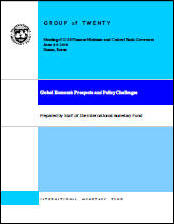Group of Twenty -- Meeting of G-20 Finance Ministers and Central Bank Governors
IMF Note on Global Economic Prospects and Policy Challenges
June 4-5, 2010, Busan, Korea
About the Executive Summary
The Following executive summary is from a note by the Staff of the IMF prepared for the June 4-5, 2010 meeting of the Group of Twenty Finance Ministers and Central Bank Governors in Busan, Korea
Read the Full text ![]()
Executive Summary
Financial market volatility has risen dramatically in recent weeks, funding costs have increased, and risky assets have been sold off across all regions. These developments reflect increased investor concern over fiscal and external sustainability in Europe; mounting policy uncertainty; and revised market expectations about the strength of economic recovery and future growth prospects.
Unless promptly addressed by credible policy action, financial market stresses could have material effects on growth.
- Thus far, the recovery has been proceeding at different speeds across regions, as projected in the April 2010 World Economic Outlook. Macroeconomic developments in the United States, Japan, and the largest euro area economies have been consistent with expectations of a modest recovery. In particular, there have been encouraging signs of growth in private demand. Activity in emerging Asia and Latin America has been expanding strongly, driven by a rebound in trade.
- Recent financial market developments, however, pose a major downside risk to the global economy. They could have negative effects on private and sovereign funding rates; on bank balance sheets and credit conditions; and on capital flows and portfolio allocations. The ability of banking sectors to withstand funding shocks is of particular concern. Economies with large fiscal and/or external balances would feel the effects of such a shock the hardest. Greater-than-anticipated fiscal adjustment itself would have direct effects on aggregate demand.
- A prolonged period of heightened risk aversion could affect other asset types and regions, as capital is reallocated to safe assets. A downturn in growth in advanced economies, whether from financial stress or more aggressive fiscal retrenchment, would likely spill over to other G-20 economies.
Urgent action is needed to restore policy confidence and address fiscal sustainability. The announcement of large-scale and unprecedented financial support in the euro area was timely, and has mitigated the immediate risk of a liquidity crisis. These measures are providing a window of opportunity for undertaking the more far-reaching reforms required to underpin a more resilient euro area economy.
Fiscal consolidation needs to be anchored by a credible medium-term plan, with adjustment in the near-term depending on country circumstances, particularly the pace of recovery and the risk of a loss of fiscal credibility:
- It is of overarching importance that G-20 countries commit now to credible medium-term fiscal adjustment plans, which could include legislation creating multi-year targets. In elaborating medium-term fiscal adjustment, legislating reforms to pension entitlements and public health care systems, making permanent reductions in planned non-entitlement spending, and strengthening fiscal institutions would be imperative.
- From a near-term perspective, most G-20 advanced economies do not need to tighten before 2011, since this could undermine the fledgling recovery, but they should not add further stimulus. Although specifics will vary by country, current fiscal consolidation plans for this group of countries for 2011—which envisage, on average, an adjustment of about 1¼ percentage points of GDP in the cyclically adjusted balance—are broadly appropriate.
- Countries currently facing sovereign funding pressures have already begun to embark on immediate fiscal consolidation. For these countries, strong signals of commitment through upfront measures, even if politically difficult, are necessary. Countries that are unable to credibly commit to medium-term consolidation may find that adverse market reaction compels them to undertake significantly more front-loaded adjustment.
- Fast-growing advanced and emerging economies can start tightening policies now. For some countries, using fiscal policy to contain demand pressures may be preferable if tighter monetary conditions risk exacerbating pressures from capital inflows. Elsewhere, however, in some countries where debt levels are relatively low, monetary tightening and exchange rate adjustment would be more appropriate than fiscal tightening.
Fiscal actions must be complemented by banking system reform and measures to enhance growth and competitiveness.
- A lesson from history is that strong growth is critically important for successful fiscal adjustment. All economies need to implement key structural reforms to improve growth prospects, especially fiscally-challenged economies that face competiveness problems.
- Authorities should work to reduce ongoing uncertainty about the regulatory environment and to implement long-awaited reforms. Banking systems remain fragile—more effort is required to ensure balance sheets are robust to future shocks. In particular, authorities should avoid unilateral measures which can have unintended consequences. These are more likely to be interpreted as uncoordinated and lacking cohesion rather than calming markets.

